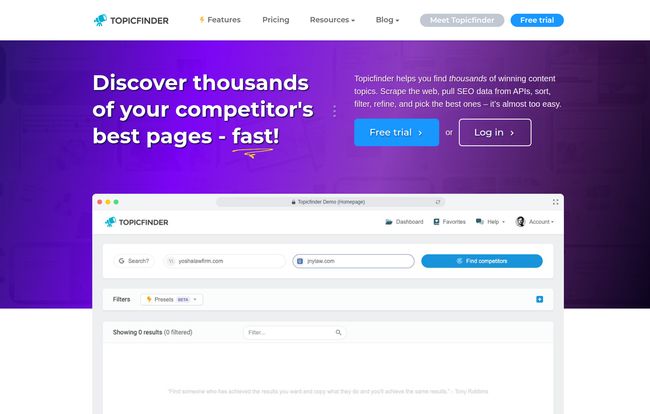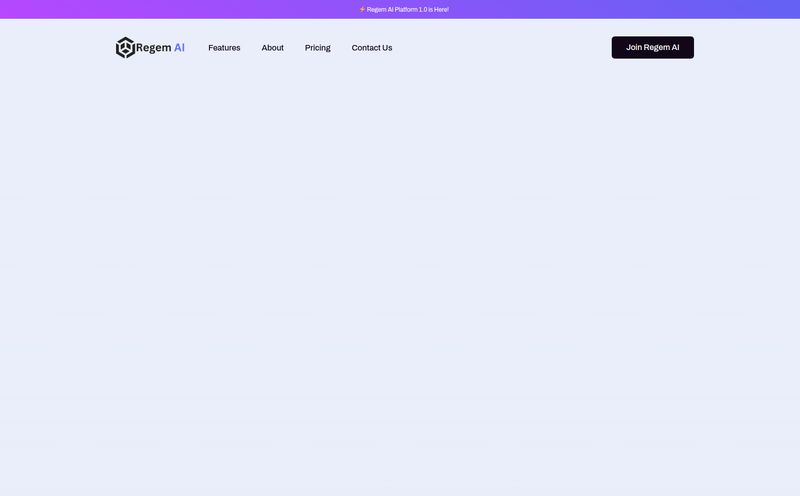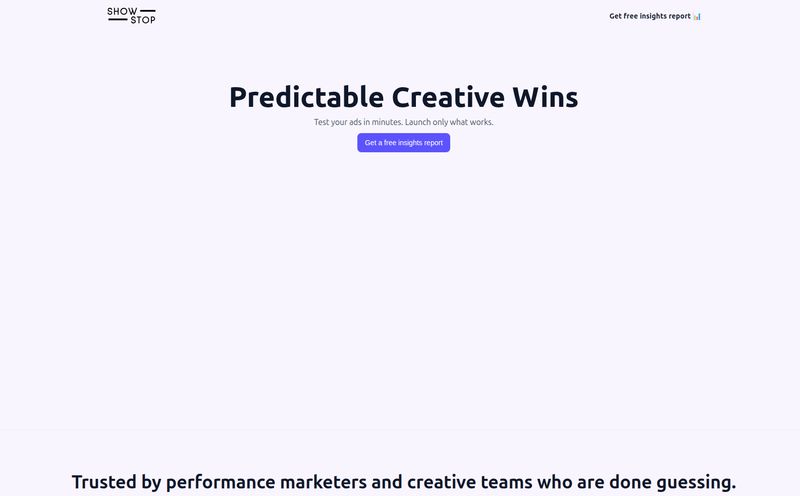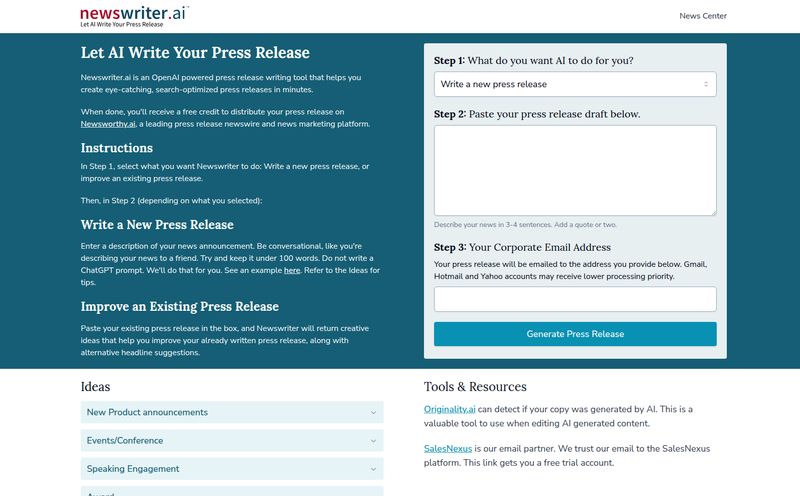If you're in the SEO or content game, you know the feeling. That blank-page dread. The endless scroll through competitor blogs, trying to reverse-engineer their success. The frantic dance between five different keyword tools, a clunky spreadsheet, and a lukewarm cup of coffee. We’ve all been there, stuck on the content hamster wheel, churning out articles hoping one will eventually stick.
It's exhausting, right? For years, my process was a messy collage of bookmarks, Ahrefs exports, and Google Docs titled things like “Blog Ideas FINAL v3 (use this one)”. It worked, kinda. But it was slow and clumsy. So when I heard about a tool called Topicfinder that promised to streamline this whole mess, my interest was piqued. A tool that claims to find proven topics by snooping on your competitors? Okay, I'm listening. But I'm also skeptical. I’ve seen a million tools promise to be the next big thing. So, I took it for a spin to see if it could really deliver.
The Old Way of Doing Things Sucks
Before we get into what Topicfinder does, let's commiserate for a moment. Think about the traditional way of finding content ideas. You probably start with a broad keyword in a tool like Semrush. You get a list of a thousand related terms, many of which are... questionable. Then you start plugging top-ranking URLs into other tools to see their traffic. You open 15 tabs to manually check each competitor's blog. You painstakingly copy-paste promising titles and URLs into a spreadsheet.
By the time you have a list, you're already drained. And you haven't even started brainstorming the actual angle or writing the outline. It's a disjointed, time-consuming slog that I, for one, am completely over. It feels like trying to assemble IKEA furniture with a spoon. You'll get there eventually, but you'll probably cry a little on the way.
So, What Exactly Is Topicfinder?
This is where things get interesting. Topicfinder isn't just another keyword generator. It’s a competitive research tool at its core. Instead of asking you to guess at keywords, it starts with a simple question: “Who is already winning in your space?”
You give it a competitor's domain, and it gets to work. It scrapes the web and pulls in SEO data to show you that competitor’s best-performing pages. We're talking about the articles that are already pulling in serious organic traffic. It’s like having a spy who can walk into your rival’s office, grab their content marketing playbook, and hand it to you.
The whole idea is to stop guessing and start using data. Why throw spaghetti at the wall when you can just see what kind of spaghetti is already sticking for everyone else?

Visit Topicfinder
How Topicfinder Changes the Game
The homepage of Topicfinder has this big “Traditional Tools vs. Topicfinder” section, and honestly, it hits home. Here’s my take on how it actually shakes things up in practice.
Finding Proven Topics, Not Just Vague Keywords
This is the biggest shift in mindset. A keyword like “best running shoes” is a starting point. An article titled “The 10 Best Running Shoes for Plantar Fasciitis in 2024” that’s already getting 20,000 monthly visits for your top competitior? That’s not a starting point; that’s a treasure map.
Topicfinder gives you the map. It shows you the title, the URL, and crucial SEO metrics like estimated traffic and keyword data. This lets you identify content opportunities with a proven track record of success. You're no longer just looking for keywords with high volume and low difficulty; you're looking for topics that have demonstrated an ability to attract an audience.
Organization That Doesn't Make You Cry
My old spreadsheet graveyard is a testament to failed organizational systems. With Topicfinder, everything you find is stored right in your account. You can run searches for dozens of competitors and all that glorious data stays put. No more downloading a CSV from one tool just to upload it to another. It’s all there.
The real magic, though, is in the filtering and sorting. You can instantly filter thousands of potential topics to find ones that meet your specific criteria. Want to see only articles with more than 1,000 monthly visitors? Done. Want to exclude any topics that mention a certain brand? Easy. This ability to slice and dice the data on the fly is something my sprawling spreadsheets could only dream of.
The AI Title Generator: Gimmick or Genius?
I'll admit, I rolled my eyes when I saw “AI-powered title generation.” It's a feature every tool seems to be bolting on these days. But... it's actually pretty useful. Once you've found a topic you like, Topicfinder's AI can spin up a bunch of alternative titles for you. They’re not all gold, but they are fantastic for getting the creative juices flowing. It helps you quickly ideate different angles and hooks without having to stare at a blinking cursor. I found it especially helpful for reframing a competitor's successful topic with a unique twist. So, I’ll call it a surprising win.
Let's Talk About Pricing and Credits
Alright, the all-important question: what’s this going to cost me? The pricing structure is pretty straightforward, but it’s built around a credit system, which is important to understand.
Here’s a quick breakdown:
| Plan | Price | Key Features |
|---|---|---|
| Trial Plan | $0 | 100 credits/day, 3,000 topics found/day, 1 user |
| Starter Plan | $39 / mo | 100 credits/day, 3,000 topics found/day, 1 user |
| Business Plan | $149 / mo | 500 credits/day, 15,000 topics found/day, 3 user seats |
So, what's a credit? According to their FAQ, performing one competitor search—which pulls their top 100 pages—costs 10 credits. So the Trial and Starter plans give you about 10 competitor searches per day. For a solo blogger or a small business, that’s probably plenty to get started and build a solid content plan. The Business plan obviously scales that up for agencies or larger teams doing research at a much higher volume.
My take? The free trial is incredibly generous and gives you a real feel for the tool's power. The $39 Starter plan seems perfect for freelancers and small content teams who have outgrown the manual process. It gives you the full power of the tool without a huge financial commitment.
The Good, The Bad, and The Nitty-Gritty
No tool is perfect. After using Topicfinder, here’s my honest breakdown.
What I really liked was the speed and the quality of the ideas. In under an hour, I had a list of 50+ proven content ideas with traffic estimates that would have taken me an entire afternoon to compile manually. It felt less like research and more like discovery. I found some absolute gems from indirect competitors I wouldn't have even thought to check.
Where it could be better? Well, it’s a subscription service, and the credit limits, while reasonable, might feel a bit restrictive if you’re on a research binge. You have to be a little strategic about the competitors you analyze on the lower-tier plans. It’s not a tool you can just leave running all day, you have to be intentional with your searches. But then again, that focus is probably a good thing.
Who is Topicfinder Actually For?
I've been thinking about this. Who gets the most out of this tool? In my opinion, it's a fantastic fit for:
- SEO Freelancers and Consultants: Quickly build powerful content strategies for new clients and impress them with data-backed topic ideas.
- In-House Content Marketers: Stop the internal debate about what to write next. Use a competitor's success as undeniable proof for your content plan.
- Bloggers and Niche Site Builders: Find proven, low-competition topics in your niche to scale your traffic faster than you could with traditional keyword research.
- Small Agencies: The Business plan with 3 seats is perfect for a small team to collaborate on client research without stepping on each other's toes.
If you're a massive enterprise with a 20-person SEO team, you might have a more complex, custom-built system. But for the vast majority of us in the trenches, this hits a real sweet spot.
My Final Thoughts on Topicfinder
So, is Topicfinder the magic bullet for content creation? No, of course not. You still have to do the hard work of creating excellent, high-quality content. But it's an incredible accelerator. It takes the most tedious, time-consuming, and frankly, guesswork-filled part of the process and turns it into a streamlined, data-driven workflow.
It clears the fog. Instead of starting with a blank slate, you start with a validated list of what works. For me, that’s huge. It's a well-designed tool that solves a real, nagging problem for content creators. It's earned a spot in my personal toolkit, and I suspect if you give the free trial a shot, it might just earn a spot in yours too.
Frequently Asked Questions
Is there a free trial for Topicfinder?
Yep! They offer a $0 Trial Plan that gives you 100 credits per day (which is about 10 competitor reports). It's a full-featured trial, so you can really see how it works before committing any money.
Which plan is the best for me?
If you're a freelancer or a small business owner, the Starter Plan at $39/month is likely your best bet. It has the same generous limits as the trial and is a great entry point. If you're part of a larger team or an agency that needs to do a ton of research, the Business Plan offers more credits and multiple user seats.
How do the credits actually work?
It's pretty simple. Every time you enter a competitor's domain and run a search, it costs 10 credits. That single search gives you a list of up to 100 of their top-performing pages. So, the 100 daily credits on the Starter plan get you up to 10 full competitor analyses each day.
Can I share my account with my team?
On the Starter Plan, it's one user per account. However, the Business Plan is designed for teams and comes with 3 user seats. This allows multiple people to access the account, run reports, and work on content plans together.



